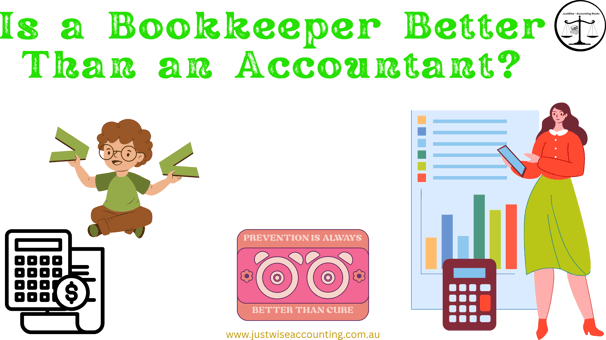Is a Bookkeeper Better Than an Accountant?
Wondering if a bookkeeper is better than an accountant for your business? Compare their roles, responsibilities, and which is right for your business stage.
Justwise Accounting
2 min read


Is a Bookkeeper Better Than an Accountant for Small Businesses?
As a business owner, you’ll eventually face this question: do I need a bookkeeper, an accountant, or both?
Each plays a specific role in supporting your finances. The key is understanding what each professional does—and when they’re most useful for your business stage and goals.
Bookkeeper vs Accountant: What’s the Real Difference?
A bookkeeper records financial transactions, maintains your business records, reconciles bank accounts, and helps organise data needed for BAS, payroll, or tax time.
An accountant interprets that data to help with tax returns, structure planning, financial forecasting, and long-term business decisions.
Think of bookkeeping as laying the foundation—and accounting as building on it.
When Is a Bookkeeper a Better Choice?
Bookkeepers are especially valuable when:
You’re starting out or running a steady small-to-medium business.
You need consistent management of transactions and bank reconciliations.
You want to stay organised for BAS and tax reporting without overpaying early on.
Bookkeepers help prepare the reports and data needed for BAS and payroll but do not lodge these with the ATO unless they are registered BAS or Tax agents and have an agreement to do so.
If lodging or compliance is required, it's the responsibility of the business owner unless otherwise arranged with a qualified provider.
When an Accountant May Be the Better Fit
Accountants are often engaged when:
You’re facing complex tax obligations or business restructuring.
You need help with forecasting or profit analysis.
Your business is scaling, or you’re applying for loans or grants.
You require support preparing and lodging tax returns.
They work with the information bookkeepers maintain—but focus on the big picture and compliance outcomes.
Do You Really Need Both?
Often, yes. A strong financial system involves both roles.
A bookkeeper helps keep your accounts accurate, while an accountant uses that data to guide your next decisions. Many accountants prefer to work with businesses that already use bookkeepers—because the data is well-prepared and reliable.
For example:
A bookkeeper can process and report payroll data, but lodging Superannuation or STP Phase 2 requires careful compliance or agent involvement.
Bookkeepers prepare BAS data, but only registered BAS agents are authorised to lodge it with the ATO.
Conclusion: It Depends on Your Needs
Rather than asking who is “better,” ask what your business needs right now.
Starting out? A bookkeeper provides day-to-day accuracy and financial clarity.
Scaling up? Add an accountant to help with structure, tax strategy, and business planning.
Bookkeepers offer vital ongoing support—but not all bookkeepers are registered agents. Always check service agreements and agent registrations for any tasks involving ATO submissions.
Need help managing your business books? Justwise Accounting supports small businesses with trusted bookkeeping solutions—and connects you with the right professionals when it’s time to scale or lodge.t content
Stay in Touch
© 2025 JustWise Accounting. All rights reserved. ABN 85 581 353 385
⚠️ We respect your privacy. Unsubscribe anytime. (under subscribe button)
Serving Australia-wide
Justwise acknowledge the Traditional Owners of the lands where we operate and pay respect to Elders past and present.
